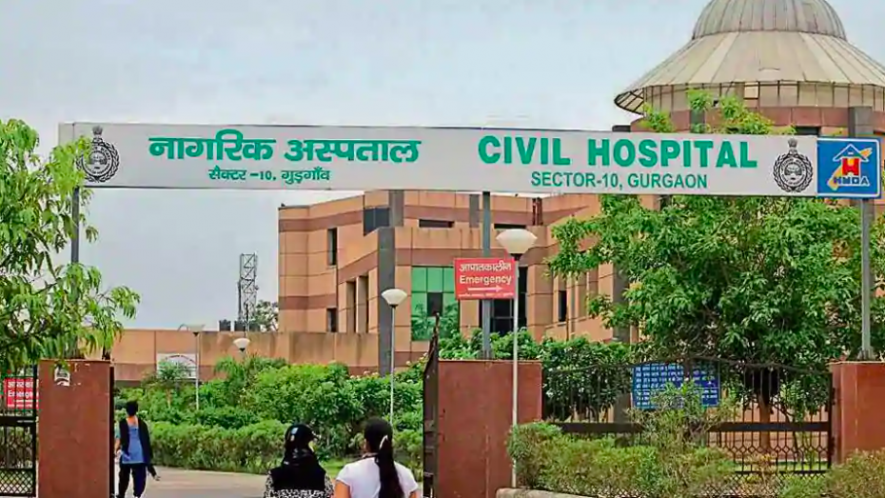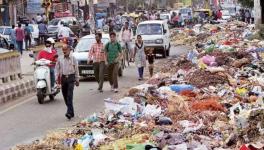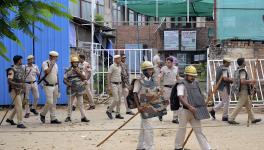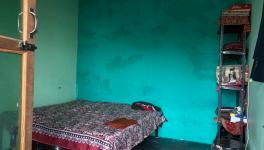Gurugram: As COVID-19 Spreads, Demands for Nationalisation of Private Hospitals Grow Louder

Representational Image Only/Courtesy-HT
The demand for nationalisation of private hospitals in the industrial town of Gurugam in Haryana is increasingly finding a voice in the wake of a spurt of COVID-19 cases in the district after the lockdown was relaxed.
After reports surfaced that workers engaged in production are contracting the viral infection, workers unions have raised their concerns over the dwindling public healthcare infrastructure. Skyrocketing bills for treatment in a private facility only make medical care unaffordable for the majority.
Satbir Singh, former General Secretary of the Centre of Indian Trade Unions (CITU) told NewsClick that there are well over 150 villages in Gurugram district. However, there are not more than 16 PHCs (Primary Health Centre) and 4 CHCs (Community Health Centre). “For a region that also attracts migrant workers, there is only civil hospital in the city and two ESI (Employee State Insurance) hospitals in the entire district,” said Singh.
Singh rues that it is often the case that a worker who develops symptoms of the novel coronavirus decides against seeking proper medical care because “government facilities here do not have the necessary infrastructure.” As a result, the worker is often asked to visit government hospitals in nearby Delhi, including AIIMS or Safdarjung Hospital, he added.
“In the name of development, malls and roads have been constructed; however, basic essential services are yet to see any improvement,” Singh said.
The problem of poor healthcare services does not only cause distress to COVID-19 patients, believes Yogesh Kumar of Inqlabi Mazdoor Kendra, another body of industrial workers in Manesar.
“With an increasing number of patients of COVID-19, government hospitals are now denying medical services to other patients,” he said. “Such complaints by industrial workers have increased,” he said.
Calling it a “health crisis”, Kumar said the situation has only added to the woes of the industrial workers, who have already been hit by job losses and wage cuts.
Highlighting these concerns, the workers, led by Inqlabi Mazdoor Kendra, staged a protest on June 16 in front of Gurugram’s district collectorate office. A memorandum to Prime Minister Narendra Modi was submitted, demanding that the government “take over” the private hospitals or nationalise them.
As of Saturday, the number of confirmed cases of the novel coronavirus in Gurugram was 4,228 – the highest for any district in Haryana. After industries were allowed to resume production following a two-and-a-half month break, in late May, the infection also found its way to the assembly lines of factory premises in Manesar’s Industrial Model Town (IMT).
NewsClick had earlier reported on how this had put the industrial workforce in a Catch-22 situation – whether to mark their presence at the workplace despite being sick, or stay at home and invite pay cuts.
The presence of an unaffordable and inaccessible healthcare infrastructure only furthers such dilemmas for the economically stressed worker.
Dr. Harjit Singh Bhatti, a physician and National President of the Progressive Medicos and Scientists Forum (PMSF), told NewsClick that the ongoing medical crisis is nothing but the fallout of a “profit-friendly” approach towards health, rather than a “people-friendly” approach.
“The result of the corporate-government nexus in health is that now around 70% to 80% of the manpower and infrastructure lies with the private sector – which runs after profit,” he said.
Dr. Bhatti tended to agree with the demands of the industrial workers, suggesting a “blanket nationalisation policy” for all private medical services in the country to tackle the virus outbreak.
“What this means is that the government administers the cost of the service while using the infrastructure and manpower already present in the private sector,” he explained. “This is the only way of ensuring proper care to the people of this country in these times,” he added.
Get the latest reports & analysis with people's perspective on Protests, movements & deep analytical videos, discussions of the current affairs in your Telegram app. Subscribe to NewsClick's Telegram channel & get Real-Time updates on stories, as they get published on our website.
























